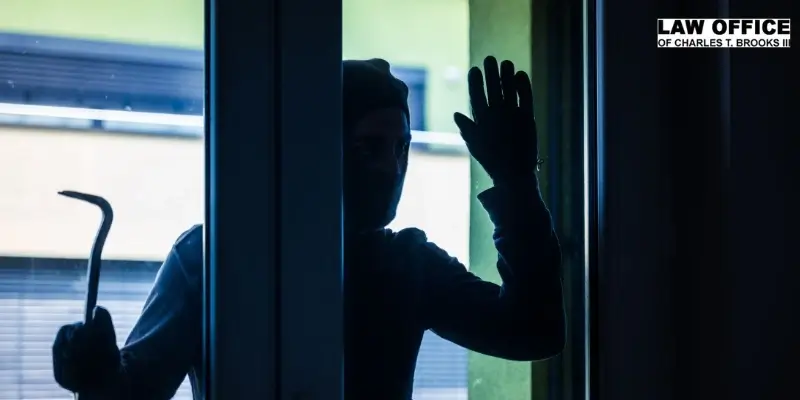|
|
Last Modified on Oct 24, 2025
Residential burglary is one of the more serious property crimes under South Carolina law, but many people aren’t clear on the specific penalties they could face. In fact, many ask, “What are the penalties for residential burglary in South Carolina?” A person’s sentence will vary based on the severity of the charges and the existence of aggravating elements, such as weapons use, previous criminal records, or people being present during the crime.
In South Carolina, authorities treat these offenses with great seriousness, and anyone facing a first offense could face a prison sentence that lasts several years. Anyone charged with a crime should know the legal terms and potential results that apply to their case.
Legal Definition of Residential Burglary
The legal definition of residential burglary, according to South Carolina Code § 16-11-311, involves illegal entry into a home with criminal intentions. While general burglary can occur in structures like sheds and businesses, residential burglary targets only homes and other human living spaces.
For a crime to be considered residential burglary, the perpetrator must have entered with criminal intent, regardless of whether the crime was completed. The determination of whether a structure meets the “dwelling” criteria and whether the person had authorization to be present affects how legal charges are processed.
Whether someone was inside the house during the incident or not (or if the crime took place at nighttime) both affect the severity of the burglary charge. In 2023, 20.4% of robberies occurred in a residence/home.
Degrees of Residential Burglary and Their Penalties
South Carolina separates burglary into three degrees. Residential burglary usually qualifies as either first-degree or second-degree according to legal definitions.
- A first-degree burglary charge applies when a person enters an occupied home while armed, causing injury, or having previous burglary convictions. The law requires offenders to serve no less than 15 years but allows for a life sentence in prison.
- Second-degree burglary pertains to unoccupied homes and lacks aggravating factors, yet it still includes a maximum sentencing period of 15 years.
- Third-degree burglary usually applies to non-residential buildings.
Parole eligibility and bond options, along with sentencing minimums, depend on the charge’s degree. In South Carolina, prosecutors typically seek the maximum charge level when aggravating circumstances exist.
Aggravating Factors That Increase Penalties
A burglary charge can escalate to a first-degree charge under specific circumstances, regardless of the initial offense’s severity. The aggravating factors that lead to a first-degree burglary classification consist of:
- Nighttime entry into the residence
- Displaying a weapon or using it during the offense
- Physical harm to any occupant
- Previous multiple burglary or housebreaking convictions
- Displaying an object that looks like a firearm
These factors modify both the criminal classification and sentencing structure, as first-degree burglary carries no chance of parole and includes a mandatory minimum sentence of 15 years. Prosecutors can file stronger charges because of these elements, while judges receive the authority to deliver tougher penalties.
Intent and Timing in Burglary Cases
Burglary charges in South Carolina require proof of intent as an essential component. The burglary charge becomes invalid if prosecutors fail to demonstrate that the defendant entered the property while intending to perform criminal actions, like theft or assault. Trespassing differs from burglary, as it does not involve criminal intent.
The time of a burglary offense influences its severity, as nighttime burglaries are considered more serious because they suggest danger to the residents. Defense attorneys commonly contest the intent behind the crime, examine the type of structure involved, and dispute the sequence of events. The decision to reduce or dismiss charges depends heavily on these elements.
FAQs
What Should I Do If I’ve Been Accused of Burglary?
When facing burglary accusations, stay silent and ask for legal representation right away. Never provide a statement to law enforcement officials without legal counsel present, even if you think there has been a misunderstanding. Burglary convictions lead to severe punishments, which may include lengthy prison terms.
An experienced defense attorney can analyze your case and collect supportive evidence. Then, they can create a legal strategy that defends your rights while contesting the state’s version of events.
Can I Be Released on Bond for a Burglary Charge?
Judges rarely grant bond in residential burglary cases, particularly when dealing with first-degree charges. Judges evaluate prior criminal history, flight risk, and any violence or weapon involvement before making bond decisions. Judges can sometimes completely refuse bond requests in certain cases.
The court could impose restrictions, such as house arrest, GPS tracking, and no-contact mandates, on the defendant’s movements. Defense attorneys have the option to request bond hearings to advocate for their client’s pretrial release.
How Do Prosecutors Prove Intent in a Burglary Case?
Prosecutors depend on circumstantial evidence to demonstrate intent because direct proof of intent is seldom available. Prosecutors use tools found at the scene, the actions that took place inside, and earlier threats or messages to demonstrate intent.
Evidence such as surveillance footage, witness statements, and your post-arrest conduct can be employed to demonstrate criminal intent. Defense attorneys frequently target the intent element as a primary strategy, especially when the property remains untouched and no crime took place within the premises.
Will a Burglary Conviction Affect Future Employment?
Yes, a felony burglary conviction creates major obstacles in your job search. A large number of employers perform background checks. They might consider a burglary conviction as evidence of dishonest behavior or potential risk, regardless of how long ago the crime happened. Applications might be rejected by licensing boards, schools, and government agencies.
Your record will permanently show the conviction, which is why you need to challenge the charge early to prevent the conviction from happening.
Contact a South Carolina Residential Burglary Lawyer
A conviction for residential burglary in South Carolina leads to severe penalties, which include compulsory incarceration and a permanent felony record. The legal system imposes strict penalties on individuals accused of breaking into someone else’s home with criminal motives, regardless of whether their case stems from a misunderstanding or mistaken identity.
Strong legal support is necessary to defend your rights, contest the prosecution’s evidence, and achieve an optimal result. The Law Office of Charles T. Brooks III can deliver skilled defense strategies customized specifically for your case. Schedule a consultation today if you are charged with burglary to discuss your available options.




